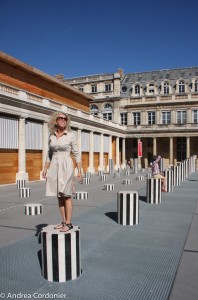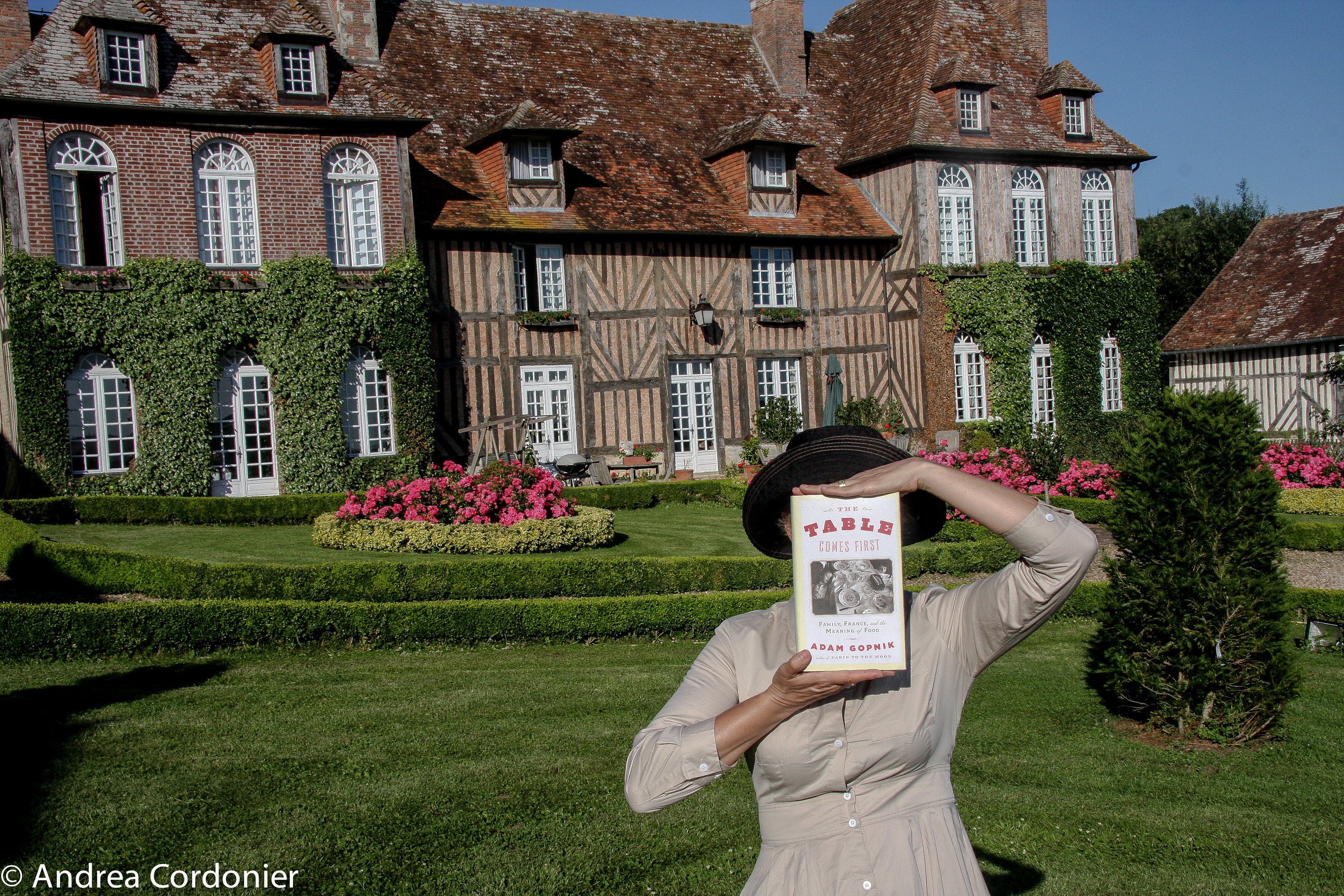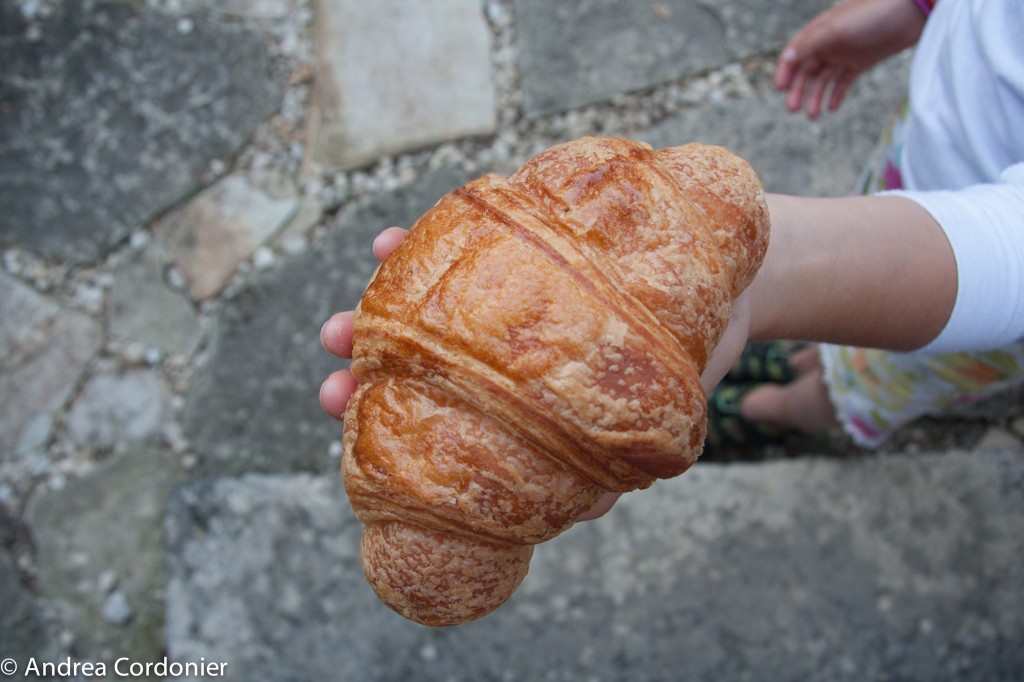16 September 2012
Mr. Adam Gopnik, Author, “The Table Comes First: Family, France and the Meaning of Food” c/o The New Yorker, New York, NY
Dear Mr. Gopnik,
I discovered Through the Children’s Gate on a trip to New York for Number Two Son’s 6th birthday. So it seemed fitting that I bring along The Table Comes First: Family, France and the Meaning of Food on this year’s European vacation.
I began by reading your book like a map. I went to the Palais Royal for the first time – the  birthplace of the restaurant – but couldn’t make head nor tail of the modern version of it. The Comedie Francaise was under renovation, enveloped in plywood walls that impeded the public spaces. The elegant Parisiennes had vacated the place, leaving crowds of tourists in their wake. Even the enclosed garden looked common and predictable in the heat and circumstances.
birthplace of the restaurant – but couldn’t make head nor tail of the modern version of it. The Comedie Francaise was under renovation, enveloped in plywood walls that impeded the public spaces. The elegant Parisiennes had vacated the place, leaving crowds of tourists in their wake. Even the enclosed garden looked common and predictable in the heat and circumstances.
I ran my eye along the apartment windows, elevated above all, wishing to be invited inside, dreaming of photographing the interiors and collecting their stories. Like so much of Europe, the best and most intimate bits are sequestered behind a veil of stone walls and shutters, impenetrable to the common flaneur. I wondered, with a hint of covetousness, which window had been yours.
I never did make it to Montigny-le-Bretonneux and to Auberge des IV Paves du Roy where your story opens with Jacques duCoeur, hero of the French Resistance, and the final meal before his death. Part of me regrets not closing the loop. The other part is content to leave him to your words and my imagination.
Your book left me with food for thought around a subject that is culturally, economically and historically ripe for consumption: how we come together to eat and the politics behind it. In it you dish up the past to establish our present, leaving the reader – me – greedy to see what comes next. Our recent time in France left me with a hint of what that might be.
*********
I cannot believe when a young couple setting off in life buys a television. Or a sofa. Or even a bed. Don’t they know the table comes first? – Chef Fergus Henderson, St. John
I love the literal and figurative title of the book and have no doubt, as you suggest, that “the table is the raft we ride through the river of our existence.”
Chef is bang-on about the propensity for buying a couch as the first symbol of adulthood. I remember my first couch – and to whom I sold it – but not my first table. Tables are less important when you’re single, eat out, and fend only for yourself. As a married with four kids, the dining room is the single most used space in our house. It is where we eat and work, where things are created and built, where answers are sought, and where we gather. The dining room table – and now physical tables plural – is the centre of our universe.
Just this week I ditched our unfriendly rectangle in favour of two rounds. One of these I have pilfered from my in-laws, shipped from Italy when they immigrated to Canada. The second – a 54″ oak round pedestal table with leaves – is on the internet, awaiting a road trip to retrieve it. Our outdoor table is temporarily making do in its stead. This future table is not my be-all, end-all; it’s simple, handsome, sturdy, large, functional, and modestly-priced. It may lack the frou-frou, but it satisfactorily eliminates the neck-craning corners and conversational blind spots implicit in a rectangle. Plus if one of my kids damages it – which is a real possibility – there’ll be no hard feelings.
Two tables renegotiate the space and permit us to function in a different way. One becomes an eating table vs. a homework/game/craft table, leaving the other space (theoretically) free from junk. There are two separate surfaces available when the little ones make war on one another. An adults-only table naturally emerges when that is a desirable scenario. It provides a piece of virtual personal space in a house where ‘mine’ always belongs to someone else, too. And it allows for two conversational groups when one super-sized one threatens to swamp its participants. It’s new. It’s different. And we’ll give it a whirl.
******
Unlike you, I am not a foodie. I am competent, reasonably creative, and usually confident as a cook, but my passions lie elsewhere. We tried, without success, to hire out the culinary duties for our month-long stay at my brother-in-law’s place in Noyers-Sur-Serein, France. I whined I was going on vacation and didn’t want to end up, by default, as the Chief Cook and Bottlewasher for a large house with a very active social life.
The difference between my expectations and reality was shocking. The funniest and most warm, loving, interesting and substantial parts of the trip focussed on communal marketing, preparation, cooking and eating with our kids, extended family and new friends. The preparations ceased to leech out of the drudgery of daily habit and necessity; they became simply pleasurable for the sake of the excellent company.
I embraced the rare opportunity to relax into my relationship with my brother-in-law, Marco, and his partner, Rod, an opportunity in short supply because of our usual geographical distance. I discovered I enjoyed the company of my children and Husband even more in the company of others. The kids loved the communal experience for the stream of playmates and the freedom awarded by happy adults otherwise engaged. Some combination of them set out each morning to procure croissants and conduct other marketing tasks around the village. The rise in my happiness level was measurable by the frequent and deep eruption of laughter from an inner place I’d recently forgotten.
On the flip side of the coin, I am reminded of my mother, who complains that she’s lost her sense of smell and taste for food. Natural aging aside, I think what she’s lost is her appetite for eating alone now that my father’s in an Alzheimer’s care facility. And I wonder: could habitually eating alone be a fate worse than institutionalization? Conversely, could more communal food preparation and consumption, beyond the restaurant experience, be a panacea for a number of our social ills? I know my biggest takeaway from our trip was the desire to eat more communally, which sounds counterintuitive coming from a woman with four young children at home.
******
As you noted, selecting menus, preparation and cooking for friends and strangers can be both stressful and anti-climactic. My sense is that the anxiety eases as trust builds, but that takes time. On our last Saturday night in Noyers I organized a casual dinner party for forty adults and kids. My anxiety around cooking for people who are accustomed to eating well – and are steeped in the rituals around it – provided the highest level of stress in our seven-week trip. A large farewell dinner party seemed like a good idea at the time.
There were two triggers at play. I am burdened with the gene that relentlessly demands “Will there be enough food?” I’d also been told that it is customary in France to arrive at dinner parties empty-handed, that all the food and all the drink is the responsibility of the host. My psychological inheritance, coupled with this bit of cultural knowledge, left me breathless. I could taste disaster on the tip of my tongue.
But disaster did not strike. An eclectic crew of locals and expats arrived, many bearing platters and bowls of food. It was a lively Franco-Canadian-American-British-Spanish-Argentinian-Italian bastardization of a party and there was more than enough to go around. But I don’t recall eating at all. I floated, slightly removed, ensuring everyone had their fill of everything. It was my pleasure and that was enough. The next day I dove into the myriad leftovers with gusto. And I glowed with happiness for at least a week.
******
I completed The Table Comes First the day before we left for Italy. I tucked it into Marco and Rod’s generous bookshelves, where it is sure to be discovered by their constant stream of international guests. It seemed the most natural place to make its new home.
While two points of anecdotal evidence do not make a trend, Mr. Gopnik, I am open to bringing you along on future travels. A return to Noyers is imminent, Newfoundland’s on the agenda and I’m looking for an excuse to go to India. Please advise if you have any books in the offing for those locations so that I can time my travel – and reading – appropriately.
In the meantime, I offer you and your family a standing invitation to join us à table anytime you crave a roadtrip “home.” If you favour a side of adventure with your meal, we’re planning a moveable feast on the Rideau River for Canadian Thanksgiving. I’ll gladly rustle up an extra canoe or two if you can make it.
Kindest regards,
Andrea Cordonier (and family)
Burritt’s Rapids (Ottawa), ON
andrea@habicurious.com


3 responses to “Dear Mr. Gopnik”
[…] But sometimes more is, well, more. If you opt for a longer stay there can be a magnificent pot of gold waiting at the end of that rainbow. Extended time allows for mistakes to happen and be corrected, meaningful conversations to unfold, longstanding issues to be hashed through, trust and empathy to be built, the quirky bits of our individuality to be appreciated, and the simple pleasure of waking up to the people we love. We get to slow down, breathe, and live a… […]
Oh, isn’t this marvellous! And yes, the table kind of anchors the family, doesn’t it? Ours — a long pine Ikea oval — is not quite right for the space it occupies but any quietly-expressed thought of replacing it is greeting with cries of No, no! from our children (all grown) and also others who’ve eaten meals in our house. Thank goodness for the orbital sander and the efficiency of good wood oil…
tk
Those pesky, sentimental children and friends! How dare they stand in the way of progress!! It’s flattering to you and and your husband that everyone resists the change. Who wants to part with such deep and pleasurable memories?
If I am invited, I will gladly take tea with you around that beloved table sometime in November, on my next trip ‘home’. And you, you are welcome at my table anytime. I think there would be zero chance the conversation would run low… Andrea